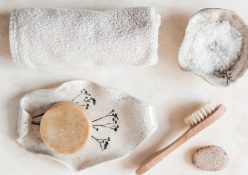Winter: It’s a love-hate relationship. Roaring fires, red wine and long baths are the best. But dry, parched and sad skin? Not so much. We’re here to help you save your face from the chill
Balancing Act
When it comes to your skin’s natural defence system, we are bombarded with endless information about your skin’s ‘pH level’, your ‘acid mantle’ and ‘compromising your barrier’. So let’s break it down…
Our skin has a natural pH level of between 4.5 and 5.5, meaning it’s slightly acidic. Optimally, it should be around 5.5 for your skin to be able to function normally. There are many factors that can affect its pH, such as the water you cleanse with, the products you use and the environment. Normal tap water can range from pH 7.8–8.4, so in order to balance out the effects on your skin (because keeping your skin away from water is just not an option), it’s important to find products with a lower pH level.
Which brings us to your acid mantle. This the ‘film’ that sebum and sweat creates on your skin to prevent bacteria, pollutants and allergens from penetrating it. This, too, has a pH of 4.5 – 5.5. If you strip this film completely, as well as your skin’s natural oils, with harsh products, you can compromise this barrier. So consider cream, milk and oil cleansers instead of anything that foams or contains alcohol. Finish it off with a toner to wipe away any remnants, balance and bring your skin’s pH back to where it belongs.
Smooth Sailing
Our skin sheds around half a billion dead skin cells every single day. So every two to four weeks, we’ve shed the entire outer layer of our skin. (Interesting fact: This is one of the major contributors to dust in homes and offices, and air-quality issues in confined spaces.) But this is not the only reason we urge you to exfoliate. In summer, we rely on the melanin in our skin to help protect us from harmful UV rays, but in winter, we produce less of it. The rate at which our skin cells shed, however, stays constant, but the air contains less humidity than it does in summer, so it’s essential to remove any unnecessary flakes so that our hydrating products can perform better. Opt for gentle exfoliants to slough away dry skin, and be sure to follow it up with a heavy-duty moisturiser or oil to avoid any further loss of moisture. Keep scrubs with harsh grains for weekly use, and formulas with small, soft grains for regular treatments. A daily chemical exfoliator (anything with low levels of lactic, glycolic or salicylic acids) can also help to loosen the protein bonds within skin cells to speed up cell turnover.
Food for thought
We can spend hours slathering on lotions and potions with the hopes of saving our skin, but often forget to look at what we’re eating. Making sure you drink enough water is the number-one step, especially in winter, when we don’t necessarily feel like we’re getting dehydrated. Without even realising it, salt, alcohol and preservatives further dry out our skin and make it look puffy, rather than plump. For skin that is ready to fight the effects of the cold weather, fill up on foods rich in omega-3 fatty acids, antioxidants and vitamins A, C and D to help your skin cope with tissue damage, inflammation and dehydration on a cellular level.
Well-Oiled
After a long day, there’s nothing better than the promise of a hot, steaming shower or bath. As inviting as it sounds, you could actually be doing more harm than good, especially if your water temperature is too high. When your surrounds are excessively hot, your blood vessels become dilated and could possibly even burst, causing redness and blotchiness, which could last for hours! Most of all, hot water is the biggest culprit when it comes to stripping oils – great for doing dishes, but not so great for your skin. When this happens, your skin is left dry and irritated, making it even more vulnerable when faced with the winter elements. Cold water, however, doesn’t remove product, sebum or debris from your skin as well, and, let’s face it, nobody wants a cold shower in winter. The solution? Lukewarm water! It gives you the cleansing benefits, but not the blotchiness.
If a steaming bath is calling your name on a particularly nippy day, replenish your skin by adding oil to the equation. Choose an oil- or cream-based body wash instead of a gel, and then lather on a heavy oil (to damp skin) the moment you step out of the bath.
Words: Leandri de Kock | Photography: Unsplash







